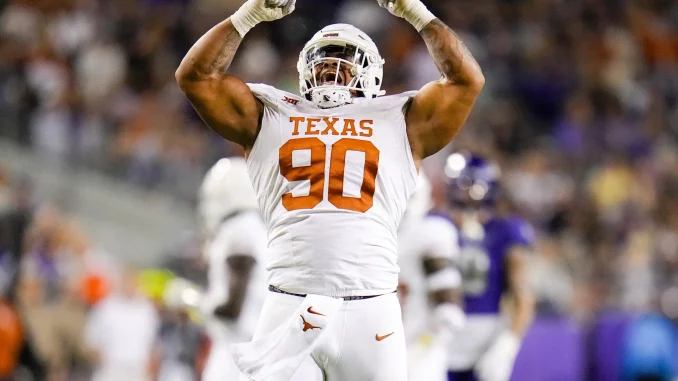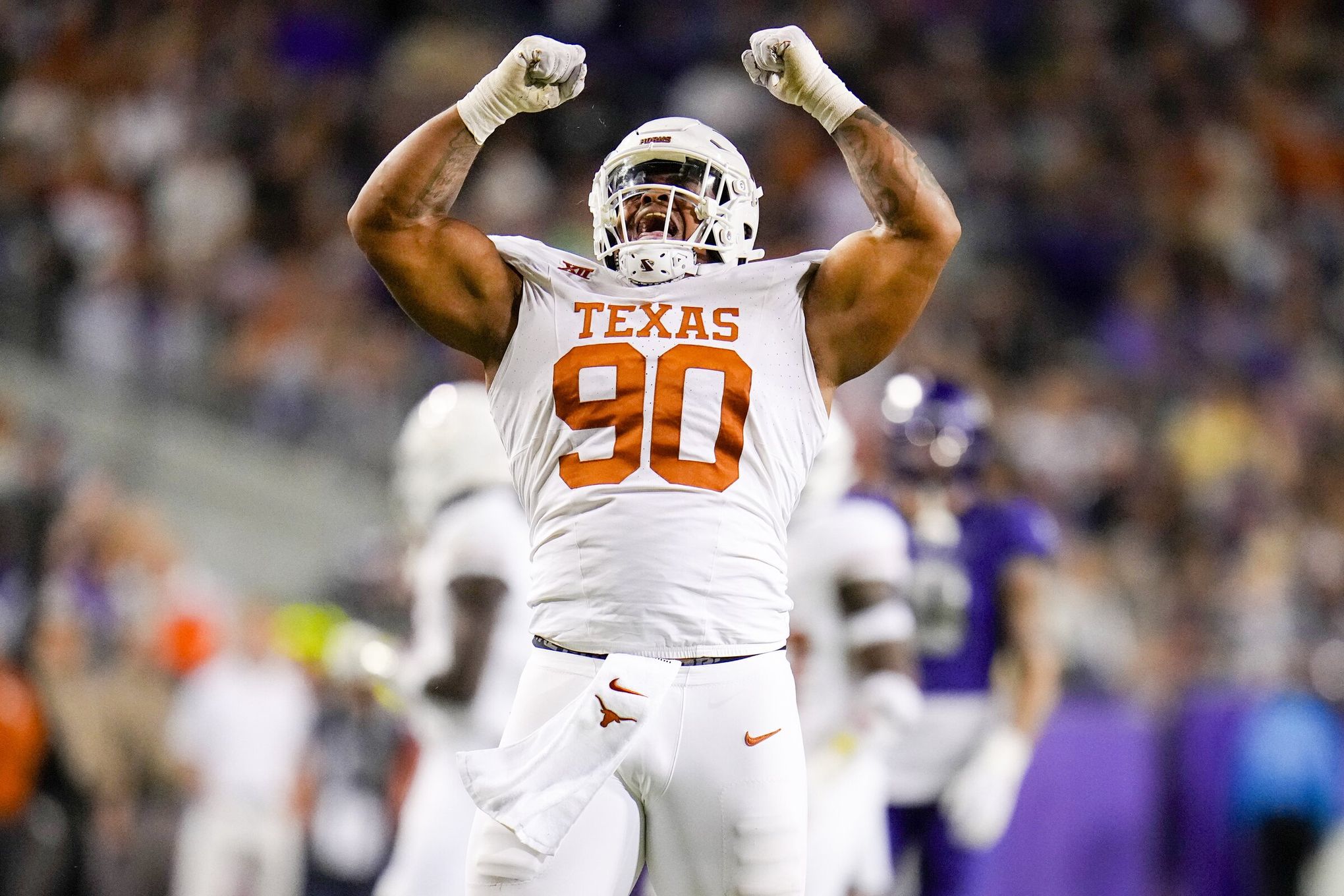
Why Byron Murphy II was the Seahawks’ first pick of new era

RENTON, Wash. — After riding shotgun with general manager John Schneider during his first draft as the Seattle Seahawks’ head coach, Mike Macdonald was asked a question that had nothing to do with any of the eight players they had just selected.
Before the start of the team’s offseason workout program in early April, Macdonald had removed blown-up pictures of some signature moments and legendary players from the Pete Carroll era that had lined one of the main hallways of the team’s headquarters. The message behind the now-blank wall was that the Seahawks who now walk past it every day have a chance to create their own legacy.
But it didn’t sit well with a vocal segment of the fan base and at least one player whose picture was taken down, Richard Sherman — never mind that the Virginia Mason Athletic Center is still full of nods to franchise history and that the hallway in question was also adorned with Carroll-inspired messages.
When asked about the redecorating for the first time Saturday, Macdonald showed deference toward the organization’s recent past while looking to the future.
“The history of success that we’ve had here, that’s what we’re chasing,” Macdonald said. “We’re trying to be back to Super Bowls and playing elite defense and smashing people up front.”
The Seahawks haven’t had a top-10 scoring defense since 2016 and have mostly been the ones getting smashed up front since then, which is easily the biggest reason why they replaced Carroll with a defensive whiz in Macdonald. And while they may never again replicate the historic dominance of their Legion of Boom days, they took a step toward returning to that style of football by using the No. 16 overall pick on Byron Murphy II, whom they viewed as the best defender in this year’s draft.
The story of how the defensive tackle out of Texas became their first selection of the Macdonald era includes a fortunate break, thanks to a record run of offensive players who went off the board ahead of Seattle, and Schneider’s decision to turn down four trade offers — “good ones, too,” he said — so he could stay put and take Murphy.
As badly as the Seahawks needed another defensive difference-maker, they weren’t necessarily intent on addressing that side of the ball with their first pick going in. Their other top target, according to sources inside the draft room, was Alabama offensive tackle JC Latham, who would have slid inside to guard to fill what was arguably the team’s top need. For much of the pre-draft process, the Seahawks didn’t think Murphy would even be available to them at 16, and with no second-round pick, they didn’t have the draft capital to trade up and get him.
Schneider said after the draft that the Seahawks had correctly predicted that six quarterbacks would be taken ahead of them. Anticipating that early run on QBs was among the reasons they bolstered that spot in March by trading for 23-year-old Sam Howell, whom they view as a potential starting option down the road.
But Schneider said it wasn’t until he wrapped up his phone calls with other NFL executives a couple hours before the start of the draft that he thought enough offensive players could be taken ahead of the Seahawks to give them a shot at Murphy.
The first round began with 14 such selections, including Latham going No. 7 overall to the Tennessee Titans. In the meantime, the Seahawks were discussing trade-back scenarios with the Pittsburgh Steelers (who picked 20th), Philadelphia Eagles (22nd), Minnesota Vikings (23rd), Green Bay Packers (25th) and Atlanta Falcons (43rd), according to sources. While the Seahawks did not try to trade up with Atlanta to take quarterback Michael Penix Jr. at No. 8, they did field a later trade offer from the Falcons, who were looking to get back into the first round after taking Penix. The Packers bowed out as Seattle’s pick approached, which is why Schneider only referred to having four opportunities to trade back from 16.
The ninth overall pick was a potential turning point for Seattle. According to sources, the Seahawks’ pre-draft intel had left them certain that if Washington receiver Rome Odunze was off the board, then the Chicago Bears would take Murphy at that spot. But with Odunze still there, Chicago continued the run on offensive players.
That lasted until pick No. 15, where the Indianapolis Colts selected UCLA edge rusher Laiatu Latu, who would not have been a consideration for Seattle because of his past neck injury. Neither was Washington offensive lineman Troy Fautanu because of knee concerns, though, medical issues aside, the Seahawks preferred Murphy anyway over the player most commonly mocked to them at 16.
And Murphy had surprisingly fallen to them.
So then the decision had arrived — either draft Murphy or trade out of that spot. Schneider’s long history of trading back and the absence of a second-round pick made another move down the draft board seem like a strong possibility, if not a likelihood. And while Schneider gave it serious thought, a source said his decision to stay put was influenced by a belief that the Seahawks didn’t need the extra draft capital as much as they might if they were in more of a rebuild.
“I’d be lying to you if I said we didn’t think about it,” Schneider said of trading back. “But the player, he was just too good. He influences the game, like a lot.”
In his first season as a college starter in 2023, the 21-year-old Murphy recorded 5.0 sacks and 8.5 tackles for loss. And while he led FBS in pressure rate (12.7%) among interior defensive tackles, his highlight reel is also full of standout plays against the run, a needed skill for a defense that has allowed the most rushing yards (4,906) of any team in the NFL over the past two seasons.
Schneider likened Murphy’s compact frame to that of Aaron Donald. At 6-foot-1 and 297 pounds, another comparison drawn inside the Seahawks’ scouting department is to two-time Pro Bowler Grady Jarrett (6-0, 305).
“He’s got that ability to jump off the ball and get up field,” Schneider said of Murphy, who ran a 4.87-second 40-yard dash at the combine. “He can play edges, he can play square, he can rush the passer inside, he gets up and down the line of scrimmage.”
The Seahawks re-signed Leonard Williams to a three-year, $64.5 million deal that makes him the highest-paid defender in franchise history. Both he and Murphy are primarily 3-technique defensive tackles, but Williams can kick outside from that spot while Murphy can move inside, often playing on the nose at Texas despite lacking the prototypical heft for that position.
“He just plays our style of football, really,” Macdonald said. “And then he’s so talented. Versatility along the front, such an aggressive player, plays violently, heavy hands for a guy [of] shorter stature, flexible, pass-rush flexibility — you name it. Yeah, just really excited to have him.”
The Seahawks did not host Murphy on a 30 visit before the draft. In fact, Schneider said he played it coy by avoiding any direct contact with him. To feel comfortable with Murphy the individual, he had to rely on his scouts as well as on his relationship with Murphy’s agent, Ron Slavin, with whom Schneider is close.
“Ryan Florence, Matt Berry, everybody in that room really that studied him, everybody loved him,” Schneider said. “He went to the combine, had a great combine … I never talked to him. I totally tried staying away from him. I didn’t think he’d be available, but still, not to try to show much interest. Our guys were all over him. The defensive staff loved him. Like Mike said, it was just complete buy-in.”
The defensive line is now the most well-stocked position group on Seattle’s roster, with Murphy joining Williams, Jarran Reed, Dre’Mont Jones and veteran free-agent addition Johnathan Hankins. The Seahawks also have Myles Adams and 2023 draft picks Cameron Young and Mike Morris hoping to find roles.
That potential logjam and the need to create cap space led to some speculation that one of them could be traded, though a source said that is not the plan. Macdonald intends to rotate his defensive linemen more than Seattle did last year, when Reed and Williams regularly played over 50 snaps per game.
“We have a lot of guys,” Macdonald said. “That’s one of the reasons I’m so excited about it, is you’re not going to know where guys are necessarily going to be all the time. We’ll have some really sweet ways to move guys around and have them in different spots based on the teams we’re going to play. A lot of flexibility going in, a lot of pass-rush opportunities, matchups, things we can manipulate. So all that’s on the table. It’ll be fun to see how it shakes out.”
Between Macdonald’s scheme and new players at all three levels, the Seahawks will look vastly different on defense. They have the building blocks to potentially be great, including a pair of Pro Bowl cornerbacks in Devon Witherspoon and Riq Woolen, Uchenna Nwosu and Boye Mafe off the edge, and now Murphy joining Williams up front.
The Seahawks considered Witherspoon the second-best defensive player in last year’s draft. They followed up that selection at No. 5 overall by taking their top-ranked defender in Murphy this year at No. 16.
Both players’ pictures should find their way onto that blank wall inside team headquarters.
Leave a Reply